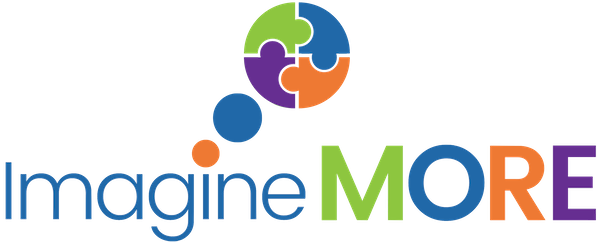How is it February already? It feels like an odd time to say this, but I hope you had a break over Christmas and are enjoying a gentle start to the year.
Here at Imagine More, we’ve started 2023 feeling excited about the events planned for this year. We’re especially looking forward to hosting events with other people in the room! Everyone gets so much more out of in-person events, and the conversations you can have during breaks are priceless.
I’m keenly aware of the benefits of face-to-face gatherings, having recently travelled to Melbourne for a meeting of the National Alliance of Capacity Building Organisations (NACBO). It’s been three years since we’ve all met in person. The meeting was productive – far more so than any of our virtual meetings – and incredibly fulfilling. We discussed many topics, including
- how each organisation delivers capacity-building information and events
- how we bring people together through various networks and
- how we each invest in leadership opportunities, especially to build the leadership capacity of individuals with disability and their families.
This sharing of stories and resources enriches our work here at Imagine More. I’m grateful to be rubbing shoulders with such an insightful, generous, and ingenious group of people.
Independent review of the NDIS
You may have heard that Minister Bill Shorten has established an independent review of the NDIS to improve the scheme. As you would agree, there are a lot of issues to address!
I’m excited to let you know you have an opportunity to ensure all issues are on the table.
Last week, I attended one of the NDIS review meetings where the facilitators wanted to know about
- the problems people face with the scheme
- the potential solutions, and
- how we can ensure the voice of people with disability and their families are heard.
I was pleased to be able to attend this meeting and share ideas of what needs to change based on what families have told us. I also shared stories of how some people are using their funding to achieve their vision of getting a good life.
I hope you will also provide your input to the review panel.
There are many ways you can share what you feel the issues are and what the solutions may be. Some of the ways you can give input to the review panel are:
- writing a note
- making a video
- sending a recording
- answering some questions.
You can read more here: https://www.ndisreview.gov.au/about
The review panel plans to share several interim reports on ‘what they have heard’ throughout the year. The final report is due to the Minister by the end of October 2023. I encourage everyone to read the interim reports to ensure the content won’t result in unintended adverse outcomes. We certainly don’t want a more restrictive scheme!
While we will always continue our systemic advocacy, our priority is supporting families to imagine, plan, create, and enjoy a fabulously ordinary life for and with their family members with disability.
Employment: Starting new again
For many of us, the new year is a time to reset our priorities and plan our goals. It can be a time we reimagine possibilities for ourselves and our family members and explore new ways to achieve our most valued hopes and dreams. It’s a time for optimism and excitement.
At Imagine More, we’ve been reflecting on better ways to help families support their family members in achieving their employment goals. As we enter the final third of the School to Work project, we will:
- Have a greater focus on helping people take action
- Shift from providing information towards a families-supporting-families approach via our Customised Employment Peer Group
- Follow all our events with discussion sessions and one-to-one support designed to help families turn ideas into action
- Provide families with practical ways to discover the interests and employable skills of their family members with disability
- Challenge conventional wisdom about what people with disability can and can’t do
- Educate employers about Customised Employment and how it benefits their businesses. (An animated explainer video for employers is currently in production)
- Upload permanent resources about customised employment to our website. This will create a library of free tools and references for families to explore and use whenever they need them.
Home: Individualised Living Options (ILO) Guidelines
The NDIS Operational Guidelines for Individualised Living Options were updated on 23 January 2023.
We found it to be a long and complex document, so here are a few points to keep in mind if you are considering applying for ILO funding. For those unfamiliar with ILO, it is funding that is used to support a person in the home. If you find this information confusing or want to discuss ILO funding in more detail, please get in touch with us.
The Home and Living supporting evidence form
When you start, you are encouraged to submit a Home and living supporting evidence form | NDIS. This identifies your family member’s goal for NDIS home and living support. The information you provide at this time is crucial because
the NDIA uses this information to decide about the allocation of funds for the Exploration and Design stage (Stage 1), and
it also influences the estimate of how much funding will be provided in Stage 2.
What is Stage 2?
Stage 2 is when the person actually starts living in their own home with supports that have been designed specifically for them. Hence, it is essential to demonstrate, even at this early point, how much paid support is likely to be needed for the person to live a good life with safety, paid and informal support, and lifestyle options in their own home. These costs can be challenging to estimate, especially if the person has no experience living outside the family home or away from their family.
The Service Proposal
During Stage 1 – Exploration and Design phase, you must develop a Service Proposal. This document details the funding your family member will need to move into and live safely and comfortably in their own home.
How Stage 2 funding is determined
In preparation for Stage 2, the NDIS considers the information you provided in the Service Proposal and decides how much funding to allocate. This amount differs for everyone and depends on their goals, circumstances, and needs. However, it is likely to relate reasonably closely to the indicative funding estimate that the NDIA provided after assessing the information in the Home and Living supporting evidence form (which also determines the allocation of funds for the Stage 1 – Exploration and Design phase.
In other words, the process for requesting NDIS ILO funding is complex. You need to be strategic about
- the timing of your application
- the detail you provide about your vision for home and
- the funds needed to bring that to reality.
It takes more than funding to create a home.
ILO funding may help some individuals take small or large steps towards supporting a person to live in a home of their own. But we know funding is only part of the picture, and funding alone won’t make Home happen. Everyone needs family, friends, and roles in their community.
This article was first published in our newsletter on 9 February 2023



